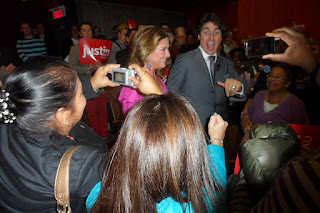Wednesday, October 3, 2012
At Justin Trudeau's official Campaign Launch
Sometimes the distinction between journalism and punditry can be hard to strike. This is even harder when you are a scribe specialising in covering political events. And, for me in particular, yesterday was one of those moments when I found myself in between a rock and a hard place. But I chose to navigate this path anyway. For that reason, whatever I am writing here is from the position of an independent observer who puts his ‘ear to the ground’ hoping to pick whatever is there to be picked.
Having worked as apolitical reporter in Uganda for a couple of years, yesterday was one of those unique moments I found myself in a difficult situation, in a different country, in a different continent and in a different atmosphere.
To start it off, I and three of my colleagues, set off at about 5:40pm to attend Justin Trudeau’s official launch for his campaign to seek the leadership of the Liberal Party of Canada and ultimately Prime Minister of Canada.
This was my first time to attend a political event when I am not under pressure to meet any story submission deadline. This event, instead, became an opportunity for I observed more things than I would have observed had I been thinking of meeting deadline or if my minds had been consumed by issues regarding which story angle I would have to take.
In this 500+community hall, there were a lot of takeaways to notice, especially as regards politics as we know it and politics as it’s practiced in Africa.
First, Mr Trudeau, whose father was a former Canadian Premier, delivered a good speech portraying his vision for the future. Specifically, he emphasized that it was the right time for the new generation to take charge, and that his leadership was about “the future, not the past”
Two hours after, I was hooked on television watching the same events I had attended; I came to learn, from watching one reporter, that the 40 year-old Liberal Party candidate was riding on his father’s legacy to attain the top party leadership.
If that is the case, then he is playing his cards differently. If this was in Africa, it would not have been a surprise to see posters printed with ‘father-son’ seated together, guarded by military artillery vehicles, with hundreds of AK47 wielding security personnel surrounding them. Now, that’s what Africans mean when they say that ‘the ex. President’s son is riding on his father’s legacy to take over power’. In fact, throughout Trudeau’s speech, I heard only one passing reference to his father. That sounds anti-African, right?
In Africa, politicians are predominantly inaccessible not only to their electorates but also to senior party delegates. Had yesterday’s event been in Africa, it would have taken anyone a ‘hell’ of time to meet and greet Mr Trudeau. But I just saw how simply he entered the Community Hall with his wife and without any military or police protection. To be clear, there was police presence but the three police officers I saw were stationed outside the community centre.
Unlike in Africa where opposition are seen by those in powers to be arch enemies, who should never be granted the right to mobilise, assemble or access any public space. I was impressed by how Trudeau explained his ideological difference with opponents of his party, whom he will face in the general elections if he is elected the flag-bearer of his party.
The Liberal Party of Canada, he said, stands for the restoration of economic prosperity of Canada’s middle class and building a better country where all Canadians can unite together as members of one family. He explained that the challenges faced by Canada cannot be solved by adopting the “wrong” agenda being proposed by the Conservative party and NDP.
"What's the response from the NDP? To sow regional resentment and blame the successful. The Conservative answer? Privilege one sector over others and promise that wealth will trickle down, eventually," he said, adding, "Both are tidy ideological answers to complex and difficult questions. The only thing they have in common is that they are both, equally, wrong."
He then positioned his quest for leadership as a takeover of the new generation which is ready to work hard and solve its own challenges. "It is time for us, for this generation of Canadians, to put away childish things," he said. "More, it is time for all of us to come together and get down to the very serious, very adult business of building a better country."
Well, coming from a country (Uganda) still suffering from undemocratic rule, it was an opportunity to wittiness democracy at its best. My country adopted a progressive constitution in 1995, which was supposed to act as a basis for the country’s democratization process but it is seventeen years since its promulgation, yet Uganda’s democratization process has been sliding backwards, reversing into a one-man’s rule.
In Uganda’s case, since 2006, three of the country’s elections results were brought before the Supreme Court and in all instances the court acknowledged the merits of the evidence brought by the petitioners. The court found evidence of rigging, militarization, and intimidation, disenfranchisement of voters and falsification of the results. In 2004, President Museveni, who came to power in 1986 promising full democracy, personally engineered the removal of presidential term-limits which allows him to rule the country for as long as he wishes. To have this term-limits amendment passed, he orchestrated a political move that saw each Member of Parliament receive a 5 million bribe. All in all, it is clear that the contrast between Politics in Canada and politics in Africa is indeed staggering. And Justine Trudeau and Canada’s multiparty democracy may probably offer an opportunity for struggling democracies like Uganda to learn the way democracy ought to be practiced.
Posted by Gerald Bareebe, Jeanne Sauve Scholar, McGill University, 2012-2013




